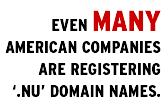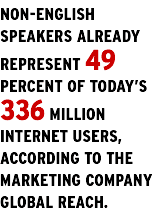| |||||||||

Foreign domain names face compatibility hurdle
 Web sites can now have names with international characters, as in "attaché" and "jalapeño," but critics working on compatibility standards say early adopters of such names are being naïve. Web sites can now have names with international characters, as in "attaché" and "jalapeño," but critics working on compatibility standards say early adopters of such names are being naïve.A Massachusetts company, .NU Domain, is one of the first Web registrars to sell internationalized domain names (IDNs). The company holds a contract with the Pacific island nation of Niue (pronounced "new way") to register Web addresses that end in its ".nu" country code. "Nu" sounds like "new" in English, but it actually means "now" in languages such as Swedish and Danish. As a result, the company is doing a bang-up job of selling ".nu" names to eager Internet pioneers in Scandinavian countries. To seed the market, .NU Domain gave away free domain names ending in ".nu" to every city in Sweden that spells its name with the Swedish characters å, ä; or ö. For example, Malmö, Sweden, is the proud new owner of malmö.nu. Addresses with ".nu" at the end are attractive in Scandinavia because names ending in the two-letter codes of governments--such as Sweden's ".se"--are often difficult for private citizens to obtain. But even many American companies are registering these types of names, including Coca-Cola.nu, a site for the giant soft-drink maker. Experts warn, however, that Web addresses with accents in them are still a bit risqué.
Paul Hoffman, director of the Internet Mail Consortium, an industry trade group of email providers, said, "They lack compatibility with email, digital certificates and other important Internet services." William Semich, president of .NU Domain, confirms this. For example, Windows 2000 theoretically supports every language in the world through the international standard known as Unicode. Yet a single accented character in the address of an email will crash many email programs, whether they run on Windows 2000, Unix or other systems, he said. To solve such problems, Semich tells his customers they must set up a parallel Web address that includes only the characters A to Z, 0 to 9 and hyphen (-). All email--and all Web surfers who are limited to English keyboards--must use this parallel address. Several proposals exist to make IDNs work with mainstream applications. The IDN Working Group of the Internet Engineering Task Force meets next week in Pittsburgh to weigh competing plans from .NU Domain, Neteka.com and others. Americans, huddled over their 26-letter keyboards, may wonder: Who would want a Web address in any language other than English? The answer: any Web site that wants visitors whose primary language is not English. Non-English speakers already represent 49 percent of today's 336 million Internet users, according to marketing firm Global Reach. And the company expects this figure to grow to 66 percent by 2005. European companies with accented names like Nestlé and Lancôme may feel that Web addresses with their names spelled correctly are "très chic." But the real push for IDNs is coming from the East. In Asian countries, it's perfectly natural for company names to be in Japanese, Chinese or Korean ideograms. Speakers of these three languages amount to 17 percent of Internet users and growing, Global Reach says. As a result, numerous Asian technical groups recently formed the Multilingual Internet Names Consortium. Its goal is the adoption of Web addresses that include Asian ideograms and any other Unicode-supported characters. .NU Domain, which says it can handle any Unicode string, already faces plenty of competition in registering Asian names. i-DNS.net International, a California company, enabled the sale of Chinese-language domain names in Hong Kong earlier this year. Buyers created a gold rush to register the Chinese equivalents of "hot" names like Business.com. i-DNS.net has already seen the registration of more than 10,000 names in Chinese and other Asian languages. Where will it all end? For "Star Trek" fans, the official Unicode Consortium is considering a proposal to support Klingon. If you're not seeing such exotic names today, I predict you will be "mañana." Consumer advocate Brian Livingston appears at CNET News.com every Friday. Do you know of a problem affecting consumers? Send info to tips@BrianLivingston.com. He'll send you a book of high-tech secrets free if you're the first to submit a tip he prints. today's guest |
|
|||||||||||||||||||||||
|
Send us news tips | Contact Us | Corrections | Privacy Policy |
|

